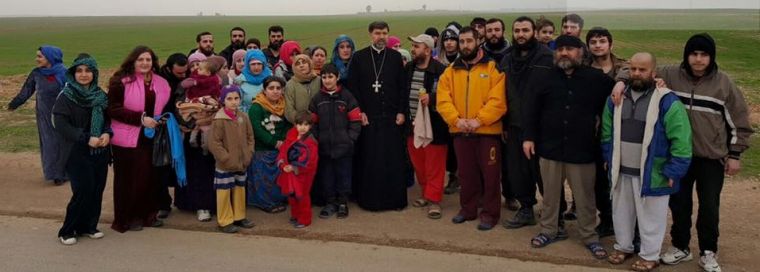ISIS releases 43 Assyrian Christian hostages in Syria

ISIS has today released 43 Assyrian Christians, the last remaining hostages of a group abducted in northern Syria almost exactly one year ago. Activists have branded their release "a ray of light from amidst the darkness".
The Assyrian Church of the East's Diocese of Syria has confirmed that the 43 were among more than 200 people abducted from villages along the Khabour River on 23 February 2015. ISIS militants undertook raids on a number of Assyrian villages near Tel Hmar, burning churches and forcing hundreds of families to flee.
ISIS has now released all of the captives, many of whom were women and children. "No hostages remain and any reports quoting other figures to the contrary are unsubstantiated," the Assyrian Church of the East Relief Organisation (ACERO) said today.
"ACERO wishes to extend its unreserved thanks to all those supporters, both institutional and individual, who have stood with the Assyrians of Syria in this arduous 12-month period," a statement from the organisation added.
"While this news thankfully marks the end of the most recent tribulation, we mourn the tremendous losses, both human and material, suffered by the indigenous Assyrians of Syria. The destruction of their livelihoods in the historic Khabur villages is a loss for the Assyrian nation and for Syria as a whole."
In a statement sent to Christian Today, spokesman for ACERO Joseph Haweil said: "43 Assyrian Christians have today attained freedom after one year of captivity in north-eastern Syria. This is the culmination of the tireless efforts of the Assyrian Church of the East in Syria and the church's international aid agency, ACERO.
"The captives who have been incrementally released over the last year have suffered inordinate psychological trauma. The attempted destruction of Assyrian continuity in Syria is only the latest installment in more than a decade of intense persecution suffered by the indigenous Assyrians throughout the Middle East. Today however the Assyrian people have witnessed a ray of light from amidst the darkness. We pray that all of Syria's suffering people may also see this light of hope."
In October, ISIS released a video showing the execution of three of the hostages, and threatened to kill those still in captivity if a multi-million dollar ransom was not paid.
Initially, militants demanded a ransom of around $100,000 per hostage, totalling $23 million. When it became clear that the Assyrian community could not afford it, the amount was lowered to between $12-$14 million. According to an anonymous Assyrian source who spoke to Newsweek today, ISIS did receive money in exchange for the prisoners, though the source declined to specify how much.
A Demand for Action (ADFA), a campaign group for minorities in the Middle East, today celebrated the release of the captives.
"As a human rights organization dedicated to work for the ethno-religious minorities, we are very thankful for the great leadership the Assyrian Church of the East has shown throughout these times and thank the Assyrian Church of the East Relief Organization for their help and tireless work to support the freed hostages," an ADFA statement said.
"We now begin to focus on re-building lives, and we start this by pressuring the United Nations to recognize the ongoing genocide taking place against these minorities who are tired of running.
"We must take action to bring awareness to what is really taking place in the Middle East. After the EU passed the resolution to recognize the atrocities taking place as genocide, it's now up to the United Nations turn to show true leadership and answer the calls and cries of all those whom have been affected and continue to be affected. The persecution of minorities must end."
Since the attacks last February, ISIS has besieged several ancient Assyrian sites, including the Iraqi city of Nimrud, the village of Khorsabad, and Hatra, a 2,000-year-old city.
An ancient branch of Christianity, the Assyrian Church of the East has roots dating back to the 1st century AD. Assyrian Christians speak Aramaic, the language of Jesus, and have origins in ancient Mesopotamia – a territory which spreads across northern Iraq, north-east Syria and south-eastern Turkey.











